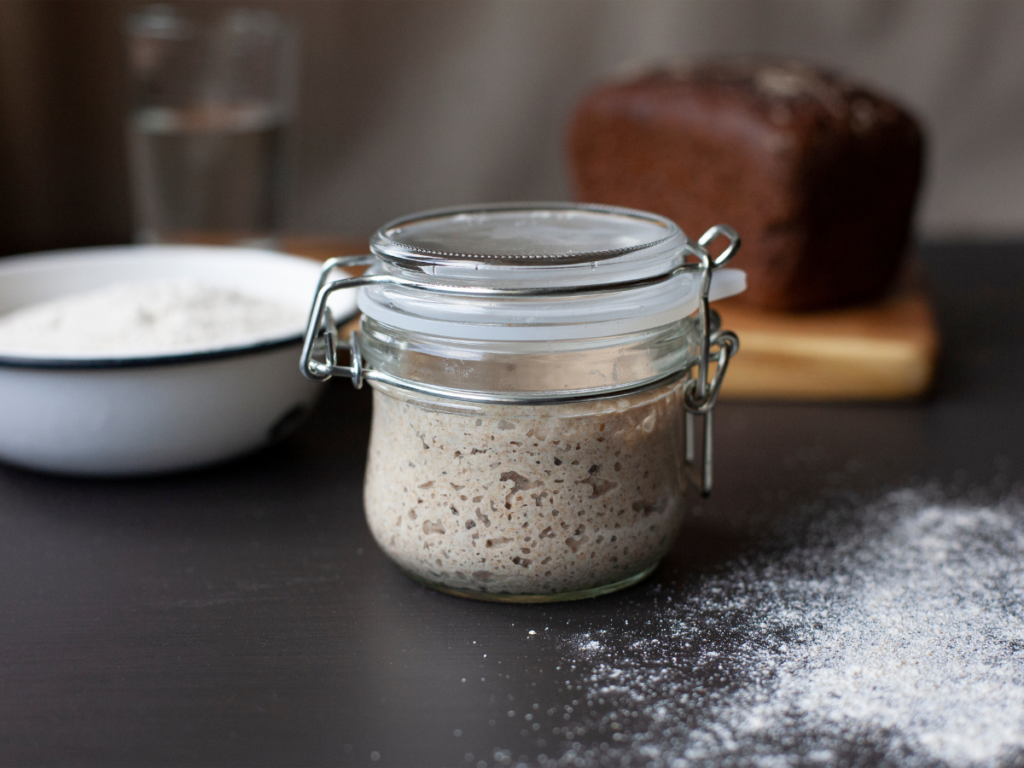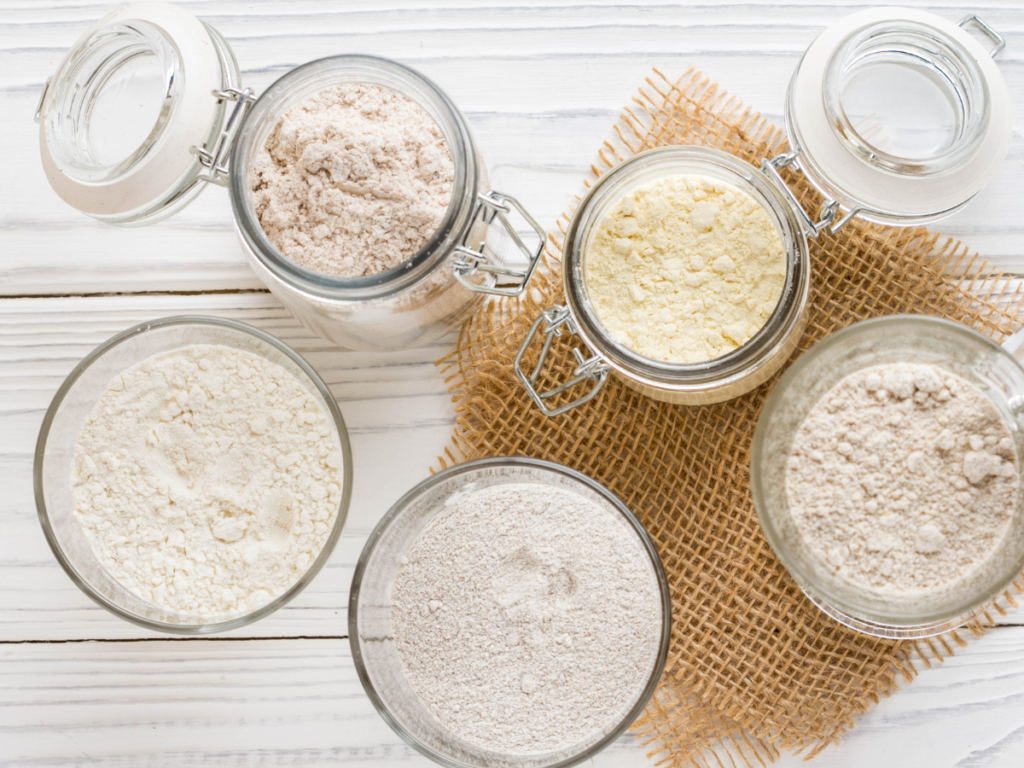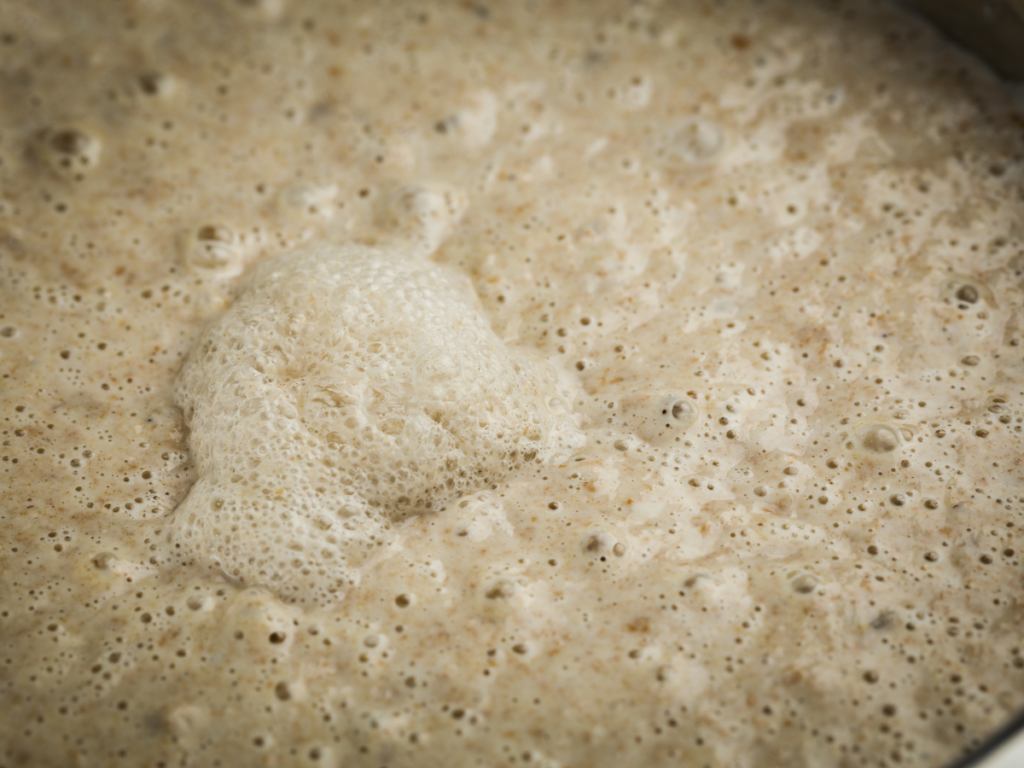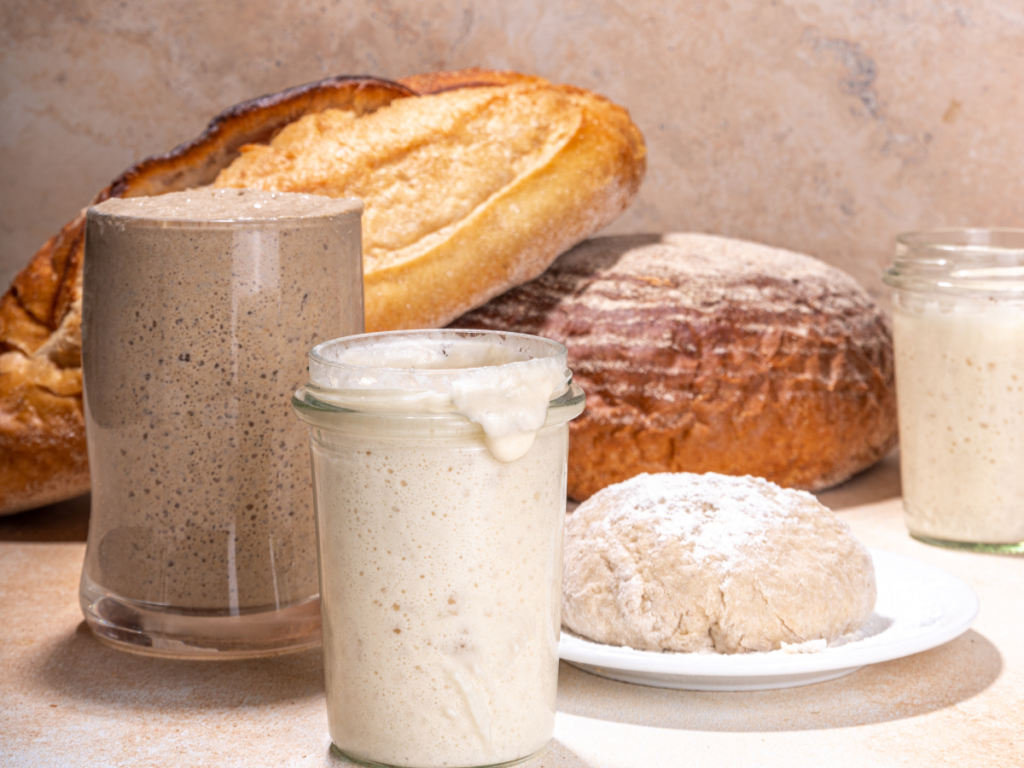
Introduction
Sourdough bread has captivated bakers and bread enthusiasts alike with its unique flavors and health benefits. The fermentation process is crucial to developing the distinct taste and texture of sourdough. One question that often arises is whether rye sourdough ferments faster than other types of sourdough. Understanding the nuances of rye sourdough fermentation can help bakers achieve better results and more flavorful bread.
The Science Behind Fermentation
Fermentation, a transformative metabolic process turning sugars into acids, gases, or alcohol, plays a pivotal role in sourdough production. In sourdough, this process is facilitated by a symbiotic culture of bacteria and yeast. These microbes feed on the sugars present in the flour, producing carbon dioxide and lactic acid, which contribute to the bread’s rise and flavor. This intricate process is what gives sourdough its characteristic tang and airy structure.
Fermentation in sourdough is a natural leavening process that dates back thousands of years. Unlike commercial yeast, which is a single strain, sourdough relies on a diverse community of wild yeast and lactic acid bacteria. These microbes not only leaven the bread but also enhance its nutritional profile and flavor complexity.
For more on sourdough fermentation, check out why won’t my gluten-free sourdough bread rise.
Rye vs. Wheat: Key Differences

Rye and wheat are two common grains used in sourdough baking. However, they differ significantly in their composition, affecting the fermentation process.
Nutritional Content
Rye flour contains more micronutrients than wheat, such as vitamins and minerals. These nutrients provide additional food for the yeast and bacteria, promoting more vigorous fermentation. Rye is rich in dietary fiber, particularly arabinoxylan, which is known to hold water and create a gel-like consistency in the dough.
Amylase Activity
Rye has higher levels of amylase, an enzyme that breaks down starch into sugars, providing more food for the yeast and bacteria. This increased enzymatic activity speeds up the fermentation process, resulting in a faster rise. Amylase plays a critical role in breaking down the complex carbohydrates in rye flour, making them more accessible to the fermenting microbes.
Gluten Content
Rye has less gluten than wheat, leading to a denser bread structure. While wheat gluten forms a strong and elastic network that traps gas bubbles, rye gluten is weaker and less elastic. This difference means that rye doughs do not rise as high as wheat doughs, but they have a unique, moist crumb and hearty texture.
For more on gluten-free baking, read gluten-free sourdough bread recipe.
Why Rye Ferments Faster

There are several reasons why rye sourdough tends to ferment faster:
Micronutrients
The abundance of micronutrients in rye flour encourages microbial activity, speeding up fermentation. These nutrients serve as growth factors for the yeast and bacteria, leading to a more robust fermentation. Rye flour provides essential minerals like magnesium, potassium, and phosphorus, which are crucial for the metabolic activities of the fermenting microbes.
Amylase Levels
Higher amylase content in rye provides more readily available sugars for the microbes. Amylase enzymes break down starches into simple sugars that the yeast and bacteria can easily metabolize. This enzymatic activity not only accelerates fermentation but also enhances the flavor profile of the bread by producing a complex array of organic acids and alcohols.
Case Studies
Many bakers report that their rye sourdough ferments faster and peaks sooner than wheat-based sourdough. For instance, according to The Fresh Loaf, bakers have observed that their rye sourdough ferments more quickly due to its composition. These observations are supported by scientific studies that highlight the unique properties of rye flour in promoting fermentation.
Practical Observations
Bakers who work with rye often notice that their dough reaches its peak activity faster than wheat dough. This is partly due to the higher enzymatic activity in rye, which creates a more dynamic fermentation environment. The increased availability of simple sugars accelerates the growth of the yeast and bacteria, leading to a quicker rise.
Managing Rye Sourdough Fermentation

To achieve optimal fermentation with rye sourdough, consider the following tips:
Adjust Fermentation Time
Since rye ferments faster, you might need to reduce the bulk fermentation time. Monitor the dough closely and be ready to proceed to the next stage of the baking process sooner than with wheat dough. Over-fermentation can lead to a sour taste and compromised texture, so it’s important to keep an eye on the dough’s progress.
Monitor Temperature
Keep the dough at a stable, warm temperature to encourage consistent fermentation. Rye flour can ferment vigorously at temperatures between 75°F and 85°F (24°C to 29°C). However, be cautious of temperatures that are too high, as they can lead to over-fermentation and undesirable flavors.
Hydration Levels
Rye flour absorbs more water, so adjust your hydration levels accordingly. A higher hydration dough can enhance the fermentation process and result in a more open crumb structure. Rye doughs are typically sticky and more challenging to handle, but with practice, bakers can master the techniques required to work with high-hydration doughs.
Creating a Rye Sourdough Starter
Starting a rye sourdough starter is straightforward and rewarding. Here’s a simple guide:
- Mix Flour and Water: Combine equal parts of rye flour and water in a jar. This mixture will become the foundation of your sourdough starter.
- Stir Daily: Stir the mixture daily to incorporate air. This aeration helps to distribute the yeast and bacteria evenly and prevents mold growth.
- Feed Regularly: Every 24 hours, discard half of the starter and add fresh rye flour and water. This feeding schedule provides a steady supply of nutrients to the growing microbial community.
- Watch for Bubbles: Within a few days, you should see bubbles and a sour smell, indicating active fermentation. The starter will become frothy and bubbly, signaling that it’s ready to use in baking.
A well-maintained rye sourdough starter can be used indefinitely, as long as it is regularly fed and cared for. Over time, the starter will develop a unique flavor profile that reflects the local environment and the specific strains of microbes present.
Baking with Rye Sourdough

When baking with rye sourdough, consider these techniques:
Kneading
Minimal kneading is required due to the low gluten content. Overworking rye dough can break down the gluten network and result in a gummy texture. Instead, use gentle folding techniques to develop the dough’s structure without compromising its integrity.
Shaping
Shape the dough gently to avoid degassing. Because rye doughs are more fragile than wheat doughs, handle them with care to retain as much gas as possible. Use a light touch and avoid excessive pressure during shaping.
Proofing
Allow adequate time for proofing, but be mindful that rye doughs can over-proof quickly. Proofing times will vary depending on the ambient temperature and the specific characteristics of the dough. Aim for a balance between allowing the dough to rise sufficiently and preventing over-proofing, which can lead to a collapsed loaf.
For more detailed recipes and techniques, refer to Amy Bakes Bread.
Case Studies and Expert Opinions
Professional bakers often share insights on handling rye sourdough. For example, bakers from The Perfect Loaf emphasize the need to closely monitor the fermentation process due to rye’s rapid activity. They recommend adjusting techniques based on the specific characteristics of rye flour.
Bakers who specialize in rye sourdough often highlight the importance of patience and practice. Working with rye can be challenging, but it offers unique rewards in terms of flavor and texture. By understanding the science behind rye fermentation and applying best practices, bakers can create exceptional sourdough loaves.
Conclusion
Rye sourdough indeed ferments faster due to its unique composition of micronutrients and
enzymes. By understanding the science behind it and applying proper techniques, bakers can successfully manage and enjoy the benefits of rye sourdough. Whether you are a novice baker or an experienced one, experimenting with rye can lead to delightful and flavorful bread.
For additional tips on managing your sourdough starter, you can also explore why is my sourdough sandwich bread dense. Rye sourdough offers a rich, complex flavor and a dense, moist crumb that is perfect for a variety of bread recipes. With a bit of practice and attention to detail, bakers can master the art of rye sourdough and enjoy its many benefits.
FAQs
Does rye sourdough take longer to bulk ferment?
Rye sourdough generally ferments faster than wheat sourdough. Rye flour contains more pentosans, which hold water and create a stickier dough that ferments more quickly. The increased activity of natural yeasts and bacteria in rye flour often leads to a shorter bulk fermentation time compared to regular sourdough made with wheat flour.
What is the difference between rye sourdough and regular sourdough?
The primary differences between rye sourdough and regular sourdough are the type of flour used and the resulting flavor and texture:
- Flour Type: Rye sourdough uses rye flour, while regular sourdough typically uses wheat flour.
- Texture: Rye bread is denser and moister than wheat bread due to the high levels of pentosans and less gluten in rye flour.
- Flavor: Rye sourdough has a more robust, earthy, and slightly sour flavor, whereas wheat sourdough tends to be milder and more varied in taste.
- Fermentation: Rye flour ferments faster because it is more prone to enzymatic activity, leading to a different fermentation process and flavor development.
Is rye better for sourdough starter?
Rye flour is often considered better for sourdough starters due to its high nutrient content and enzymatic activity, which promote vigorous fermentation. The natural sugars and starches in rye flour provide an excellent food source for the wild yeasts and bacteria in the starter, leading to a more active and robust culture. Many bakers use rye flour to start or refresh their sourdough starters for these reasons.
Does rye sourdough need more water?
Yes, rye sourdough typically requires more water than wheat sourdough. Rye flour absorbs more water due to its higher fiber and pentosan content, leading to a stickier and wetter dough. Adjusting the hydration level is crucial when working with rye flour to achieve the desired dough consistency and bread texture.
